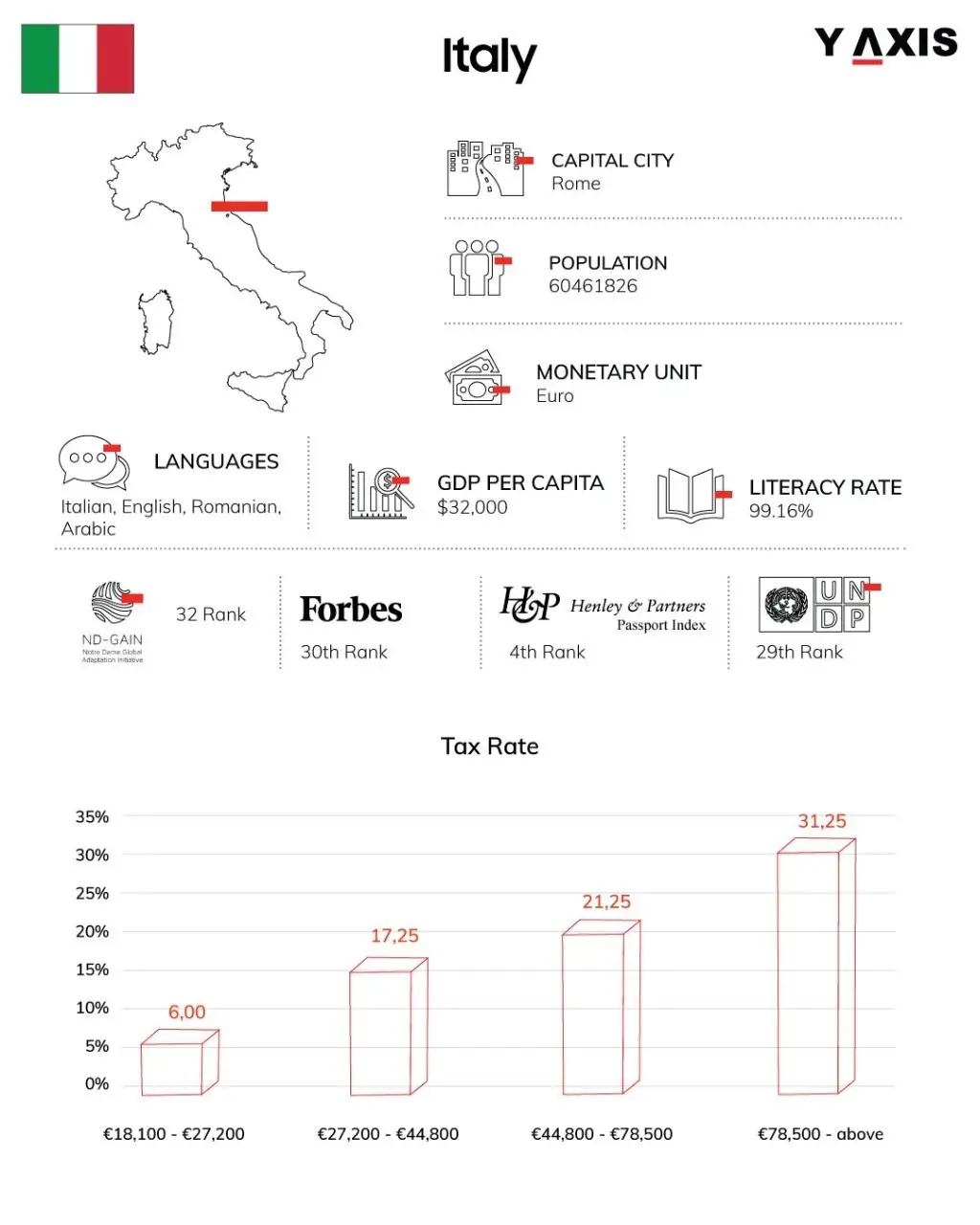Posted on November 09 2021
Why and how you can migrate to visit, study, or work in Italy
By , Editor
Updated November 15 2023
Have you ever been fascinated by Italy? It’s not just about the language and the vibrant culture, but also about a lot more that you can consider if you are moving to another country. As travelers, going to Italy on an Italy tourist visa could have been one plan on your bucket list. But if you are more serious about Italy, you may want to immigrate and work in Italy.
Let’s start with the obvious and check out why Italy could be your next best destination for various reasons.
Touring Italy
Italy is a treasure trove of European history. So, if you want to visit historic locations in Europe, Italy can’t be missed in your travel plan. Here are some of the best reasons to choose to tour Italy.
- The Colosseum
- The cathedral of Florence Duomo Santa Maria del Fiore
- Gondola ride in the canals of Venice
- Pompeii and the still fuming Mount Vesuvius
- The leaning tower of Pisa
- Enjoying the majestically scenic lake Como
- Visiting the coastal regions of Amalfi Coast and Cinque Terre
- Vatican City
- Pantheon
- Visiting the Blue Grotto
Italy features a mild climate and a relatively low cost of living. There’s also a very efficient healthcare system in the country. A taste of Italian experience could well inspire you to stay back, for which you should be exploring other options like work and residency.
You can visit Italy on an Italy tourist visa. While applying for the visa, you must submit the following:
- A completed visa application form
- A valid passport with at least 6 months of validity remaining while applying
- Proof of accommodation (E.g., hotel reservation)
- An airway ticket with the date of departure, flight number, and date of return given
- Proof of sufficient financial resources to meet the expenses of the visit
- Travel insurance
Moving to Italy – How non-EU nationals do it
To move to Italy being a non-EU national, you will need an Italian long-stay visa. If you want to live in Italy for over 90 days, you will need this visa. The visa is also called the D-visa.
The D-visa will allow you to enter Italy. After stepping inside Italy, you will have to procure an Italian residence permit. Only then you will be authorized to stay in Italy for over 90 days.
Your purpose of staying in Italy will decide the type of Italian long-stay visa to go for. Here are some of them:
- Italy Study Visa – You must be above 18 years of age and enrolled in an Italian educational institution.
- Italy Work Visa – You must use this visa to move to Italy to do salaried work. You must have obtained a job in Italy before you move into the country.
- Italy Working Holiday Visa – You must be aged between 18 and 30 years and must be nationals of countries that are associated with Italy for the working holiday program.
- Italy Family Visa – This visa is useful If you want to join your family member who is either an Italian citizen or holder of an Italian permanent residence permit.
- Italy Self-Employed Visa – This is for you if you are a self-employed individual wanting to work in Italy or an entrepreneur intending to open a business in Italy.
https://youtu.be/6yPBeY3em3g
Moving to work in Italy
If you are a non-EU citizen, you will have to try your luck at moving to Italy to work. This is because there’s a set number of Italian work visas that are dictated via the Decreto Flussi. The Decreto Flussi is opened by the Italian government every year and you are supposed to apply for a work visa when it's open. The government even sets the number of work visas issued to each occupation!
Even if you are entering Italy as a self-employed person, you will have to be in compliance with the Decreto Flussi.
Moving to study in Italy
It’s necessary that you are already enrolled in an Italian educational institution to get an Italy study visa. Your application for the Italian ling-stay visa must cite that you are in the country for the purpose of your studies.
If you are in Italy on a study visa, you are allowed to work a maximum of 20 hours a week. Post-studies, you will have to apply for an Italy work permit to stay on. The application to this effect must be lodged when the Decreto Flussi is open. You can convert your study permit to a working residence permit.
Moving to meet a family member in Italy
In case you have a family member in Italy, who is an Italian citizen/PR that you want to meet, you can travel to Italy to meet them using the Italy Family Reunification Visa. As the first step, the Italian family member must apply for authorization for you to arrive in Italy.
Once you are granted the authorization, you can apply for a family reunification visa and arrive in Italy. Then, within 8 days, you must apply for an Italian residence permit.
Moving permanently reside in Italy
You can apply to become a permanent resident of Italy after living on a temporary resident visa in Italy.
If you are looking to Study, Work, Visit, Invest, or Migrate to Italy, talk to Y-Axis, the World’s No.1 immigration & visa company.
If you found this blog engaging, you may also like:
Tags:
work in Italy
Share

